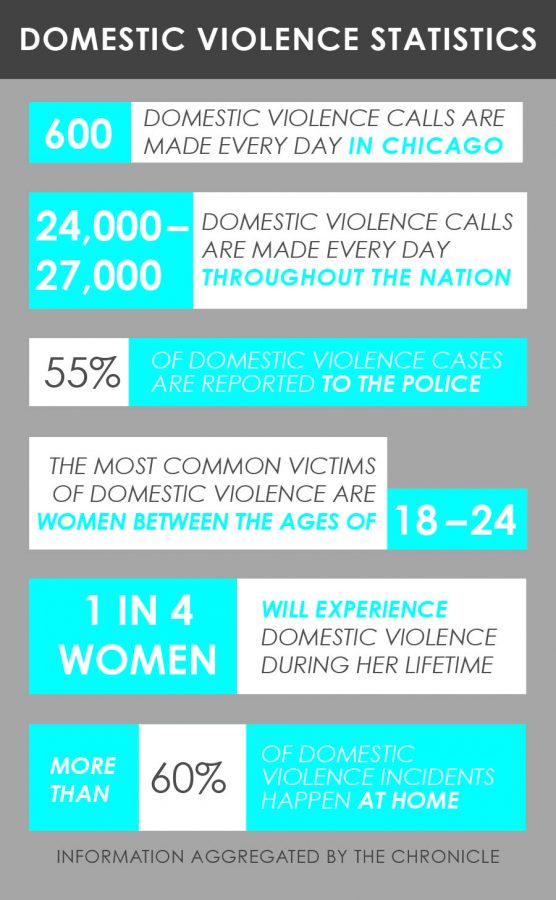City expands pilot domestic violence prevention program
DOMESTIC VIOLENCE STATISTICS
March 16, 2015
The mayor’s office announced Feb. 26 Chicago would expand its domestic violence prevention pilot program beyond the 14th Police District to the 3rd Police District.
The program was created to provide police officers with additional specialized training in handling domestic violence calls and build a stronger relationship between the Chicago Police Department and domestic violence advocacy groups, said Kathleen Doherty, executive director of the Chicago Metropolitan Battered Women’s Network, a domestic violence hotline, 1 E. Upper Wacker Dr.
“Officers need to be tactical and safe, so training for officers to respond tactically and safely to domestic violence is paramount,” said Dr. Brian Kinnaird, a certified domestic violence advocate and former Kansas police officer.
Although domestic violence calls are one of the most dangerous situations an officer can enter, Kinnaird said, officers do not receive adequate training for it.
“If they don’t get there safe, if they don’t get there alive, they are not able to help, and they are not able to go home themselves,” Kinnaird said.
Domestic violence calls are the most common calls any police officer receives, Kinnaird said. He received domestic violence calls every day for 10 years when he was a police officer. He said when he was in the Police Academy, the only domestic violence training he received was an eight-hour class.
Chicago’s new domestic violence program requires police officers, with the consent of victims, to fill out risk assessment worksheets for every domestic violence call they receive. Officers then send the completed worksheet to Family Rescue, a domestic violence agency located at 9204 S. Commercial Ave., where worksheets are evaluated within 24 hours of a call being made, said Himagiri Sharma, program director of the court advocacy program at Family Rescue.
“When an incident happens, the more quickly you can reach a victim of that incident, the more likely there will be a successful conclusion,” Sarma said.
The assessments include a series of questions that help determine a victim’s level of danger.
After Family Rescue receives the risk assessments, it prioritizes them, reaching out first to victims who appear to be in the most danger. Family Rescue calls every victim who has filed a risk assessment three times, Sarma said.
Family Rescue and the CMBWN are the two main domestic violence prevention groups working with the CPD on the new program. Family Rescue works one-on-one with victims, and the CMBWN provides police officers with specialized training for handling domestic violence calls, Doherty said.
Family Rescue is the only domestic violence agency that works directly out of a police precinct, Sarma said.
It is vital for advocates against domestic violence to be with victims through every step of their recovery process, Sarma said. The most effective way for advocates to help victims is by working in a police station, she said.
“When a victim comes in through the station distraught and in the midst of the emergency, [we are] able to bring them into our offices, where we can offer them a safe space,” Sarma said.
Kinnaird said one of the most important things police officers learn through domestic violence training is empathy and compassion. Officers must be considerate and kindhearted when going through a victim’s options.
“Those are two emotions that police officers do not show in public,” Kinnaird said.
With specialized training, police officers can learn how to interact with domestic violence victims in a manner that will help them build their trust, he said.
Doherty said her organization decided to work with the city to pilot the program because it allows them to work closer with victims.
“If you know there is a better way to operate and address issues, then why wouldn’t you partner to make a difference on that?” Doherty said.








